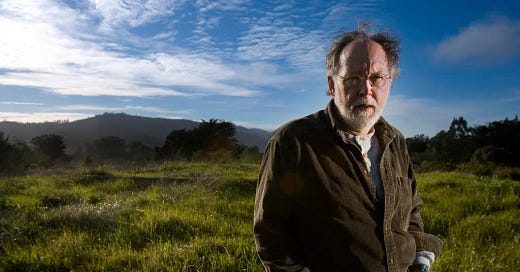(Author’s Note: please enjoy this excerpt from a bigger project that I am working on that features short spotlights on people who have been influential in conservation. More on this project soon, I promise!)
Barry Lopez gave us a different perspective on nature: where others wrote about conquering the wild, Lopez writings suggested that we be humbled by it.
Across ice sheets, deserts, forests, and rivers, Lopez walked the edge of the human and the wild, asking the kind of questions most people are too busy to sit with. What does it mean to belong to a place? How do we treat a landscape like a relative, not a resource? How do we listen to the land?
Photo Credit: Peter DaSilva for The New York Times
Born in 1945, Lopez was a natural observer. He spent much of his early life between New York and California, eventually settling in Oregon, where he would spend decades quietly crafting some of the most lyrical, profound nature writing of the 20th century. His best-known book, Arctic Dreams, is both an exploration of the far north and a meditation on what it means to pay deep, careful attention to the world. He wasn't just describing landscapes; he was translating them, as if trying to help readers hear something they hadn’t noticed before.
Lopez believed in science, but he also believed in wonder. He wrote with reverence for Indigenous knowledge, for the unseen networks of life beneath our feet, for the stories embedded in stone and ice and wind. In Of Wolves and Men, he traced not just the biology of wolves, but the mythology, the hatred, the love, and the cultural weight those animals carry. His work was a bridge between worlds, between disciplines, between people and place.
He was no firebrand like Edward Abbey. Lopez was quieter. While Abbey shook his fist at the world, Barry Lopez opened his palms to it. But that doesn’t mean he was passive. His words pushed back against a culture of extraction and arrogance. He believed that storytelling was a moral act, and that how we speak about the land reflects how we treat it. He once wrote, “Sometimes we need a story more than food to stay alive.” For Lopez, those stories were rooted in ecology, but nourished by empathy and feeling.
He died in 2020, leaving behind a legacy of writing that asks readers to slow down, look closely, and live with a deeper sense of responsibility to each other and the planet.
➤ Why He Matters
Barry Lopez offered an alternative to the dominant narrative of nature as something to be used or overcome. He treated landscapes as moral and emotional touchstones, worthy of respect, complexity, and care. His writing continues to shape how scientists, artists, and everyday people think about place, presence, and responsibility.
➤ What You Can Do
– Read slowly. Pick up one of Lopez's books and let the quiet truths settle in.
– Practice listening to the land. Go for a walk with no agenda. Notice, don't name. Just observe.
– Tell stories. Share your experiences with the wild, however small. In Lopez’s world, storytelling wasn’t a luxury, it was an ethic.
🌍 Side Trail: Travel with Wonder
📚 Read:
– Arctic Dreams - Lopez’s National Book Award–winning meditation on the Arctic, full of science, awe, and deep listening.
– Of Wolves and Men - an exploration of the biological and cultural life of wolves, and our complex relationship with them.
– Horizon - his sweeping final work, part travelogue, part spiritual reflection on human history and ecological entanglement.
🎧 Listen:
– To the Best of Our Knowledge (Episode: “Living with Animals”) includes a thoughtful segment on Lopez’s views on coexistence and the ethics of presence.
– Emergence Magazine Podcast. Many of Lopez’s essays and talks appear here, focusing on sacred geography and storytelling.
🎥 Watch:
– Barry Lopez: Horizon (Oregon Public Broadcasting). A short, poetic look at Lopez’s worldview as he reflects on decades of travel and writing.
– The Nature of Things: Stories That Sustain Us. Not specific to Lopez, but deeply in line with his ethos.
🌿 Do:
– Visit a place you think you already know, your backyard, a local trail, and see it with Lopez’s eyes: slowly, attentively, and with reverence.
– Start a “place journal.” Note the wind, the light, the smells, the birdsong. You don’t have to be a writer to keep a record. You just have to care.





Barry Lopez is one of my heroes. His work resonates with me in a way few others do. Thank you for articulating so well why his work matters. His death was such a loss. We need his voice now more than ever.